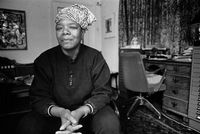"I'm always trying to be a better human being, and I continue to learn my craft. Then, when I have something positive to say, I can say it beautifully. That's my responsibility."
Is there a balance between spontaneously creating and methodologically crafting? When do artists create their best work? What do we do with young geniuses like Arthur Rimbaud, who utterly changed poetry in his 18-year-old image? What about T. S. Eliot, a more trained and experienced poet who gave us the defining mood poem of the 20th century?
 "Shift and Stack," 2019 by Anne Butler. "My working method is intrinsically connected to the act of making," writes Butler of her labor-intensive architectural pieces.
"Shift and Stack," 2019 by Anne Butler. "My working method is intrinsically connected to the act of making," writes Butler of her labor-intensive architectural pieces.What is the responsibility of an artist to craft, to herself, to her audience? Is it to tap into some striking unconscious and slap what's witnessed on the page? Is it to hone a skill repeatedly until it transcends itself?
Maya Angelou (April 4, 1928 - May 28, 2014), whose vast body of work is both autobiographical and poetic, has a firm opinion.
My responsibility as a writer is to be as good as I can be at my craft. So I study my craft. I don't simply write what I feel, let it all hang out. That's baloney. That's no craft at all. Learning the craft, understanding what language can do, gaining control of the language, enables one to make people weep, make them laugh, and even make them go to war. You can do this by learning how to harness the power of the word. So studying my craft is one of my responsibilities.
Angelou's respect for the craft extends into her daily life as a writer:
It's a strange condition, being an autobiographer and a poet. I have to be so internal, and yet while writing, I have to be apart from the story so that I don't fall into indulgence. Whenever I speak about the books, I always think in terms of the Maya character. When I wrote the teleplay of I Know Why the Caged Bird Sings, I would refer to the Maya character so as not to mean me. It's damned difficult for me to preserve this distancing. But it's very necessary.
This emotional distance is pivotal to creating an artistic existence from the furnace of real life. Maya Angelou wrote seven autobiographies when autobiographies were not a major literary form - especially not for American women of color. Her first book, I Know Why the Caged Bird Sings, published in 1969, is impactful because it shot a blaze of consciousness of what it was like to be a poor, Black female in America (like James Baldwin's Notes of a Native Son did fifteen years earlier).
It is impactful because it is exquisitely written. Angelou's language is lightly touched with her aesthetic but also sharp and incisive: poised and perfected. And it originates here: "I'm always trying to be a better human being, and I continue to learn my craft. Then, when I have something positive to say, I can say it beautifully. That's my responsibility."
Angelou did just that.
People in Stamps used to say that the whites in our town were so prejudiced that a Negro couldn't buy vanilla ice cream. Except on July Fourth. Other days he had to be satisfied with chocolate.
A light shade had been pulled down between the Black community and all things white, but one could see through it enough to develop a fear-admiration-contempt for the white 'things.'
From Maya Angelou's I know Why the Caged Bird Sings
Not only does life dovetail into art, but people who are practiced in the craft, like Angelou, find it hard to separate the two. The responsibility of a writer is to take everything felt, everything experienced, and melt that unsayable mess into words - beyond words.
All my work, my life, everything is about survival. All my work is meant to say, “You may encounter many defeats, but you must not be defeated." In fact, the encountering may be the very experience which creates the vitality and the power to endure.
 Maya Angelou in 1988.
Maya Angelou in 1988.Angelou's poetry on pain and survival confronts the fault lines of humanity. I also recommend her love and inspiration to the imagined daughters she cultivated during her essential life.
Her wisdom included here comes from an interview project by African-American studies scholar and critic Claudia Tate, published in 1983 as Black Women Writers at Work. The interviewees include Angelou, Toni Morrison, Gayl Jones, Alice Walker, and others for whom, in the words of Audre Lorde: "a voice has not yet existed."
The most striking line of Tate's interview with Angelou is a small comment, almost forgettable in the larger context. But then you inhale it steadily and realize that even through her lifelines of poetry and autobiographies - all vastly true and honest - much of Angelou's life remained unspoken.
Some events stood out in my mind more than others. Some, though, were never recorded because they were either so bad or so painful, that there was no way to write about them honestly and artistically without making them melodramatic.
Whether art is best made through subconscious explosion or passage across the concentric circles of craft, I cannot think of anything grander, purer, or more triumphant than a writer concerned with self first (her line - "I learned to forgive myself first" is unexpected relief) followed by the meticulous execution of craft so that when something important needs to be said, it can be said beautifully.

